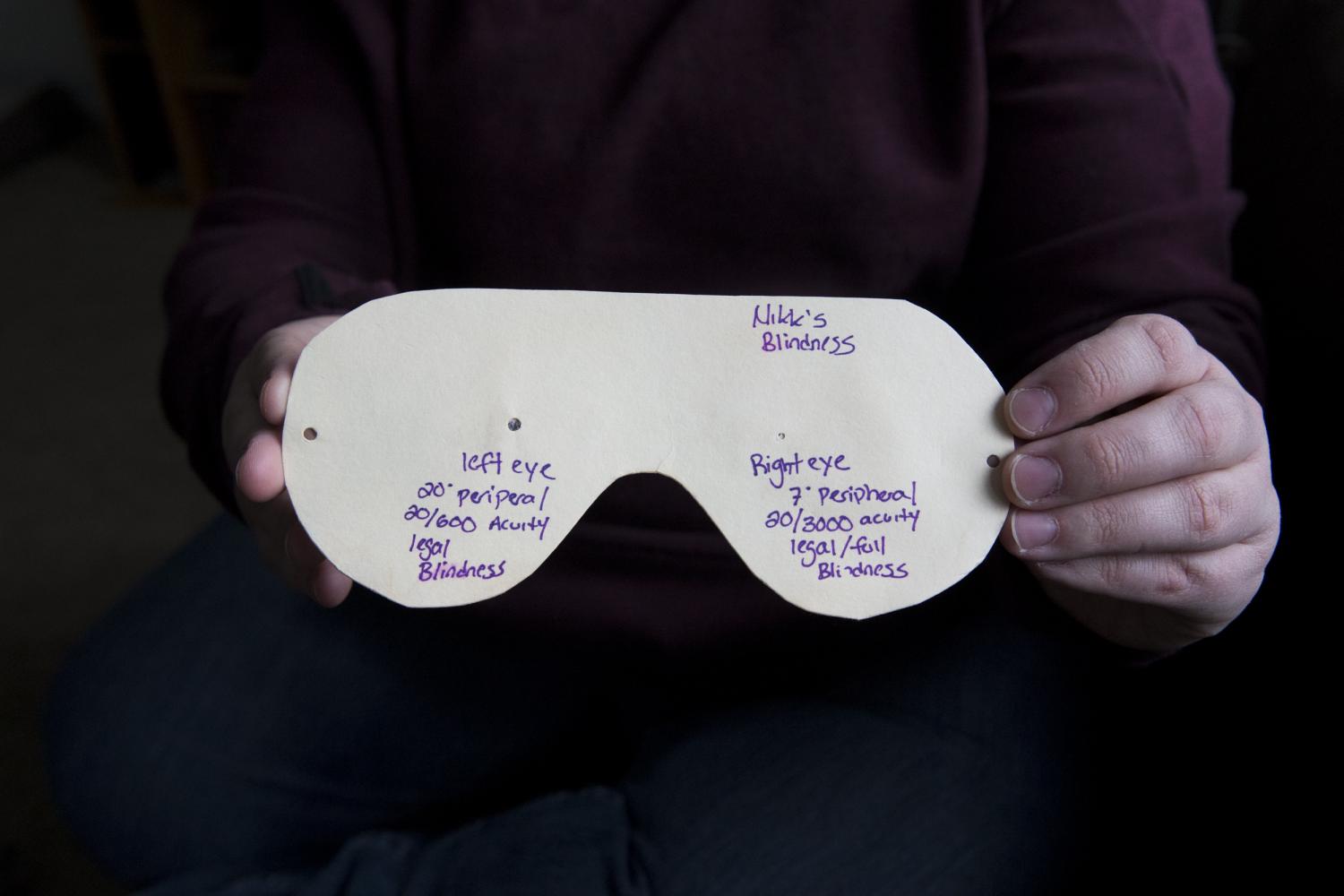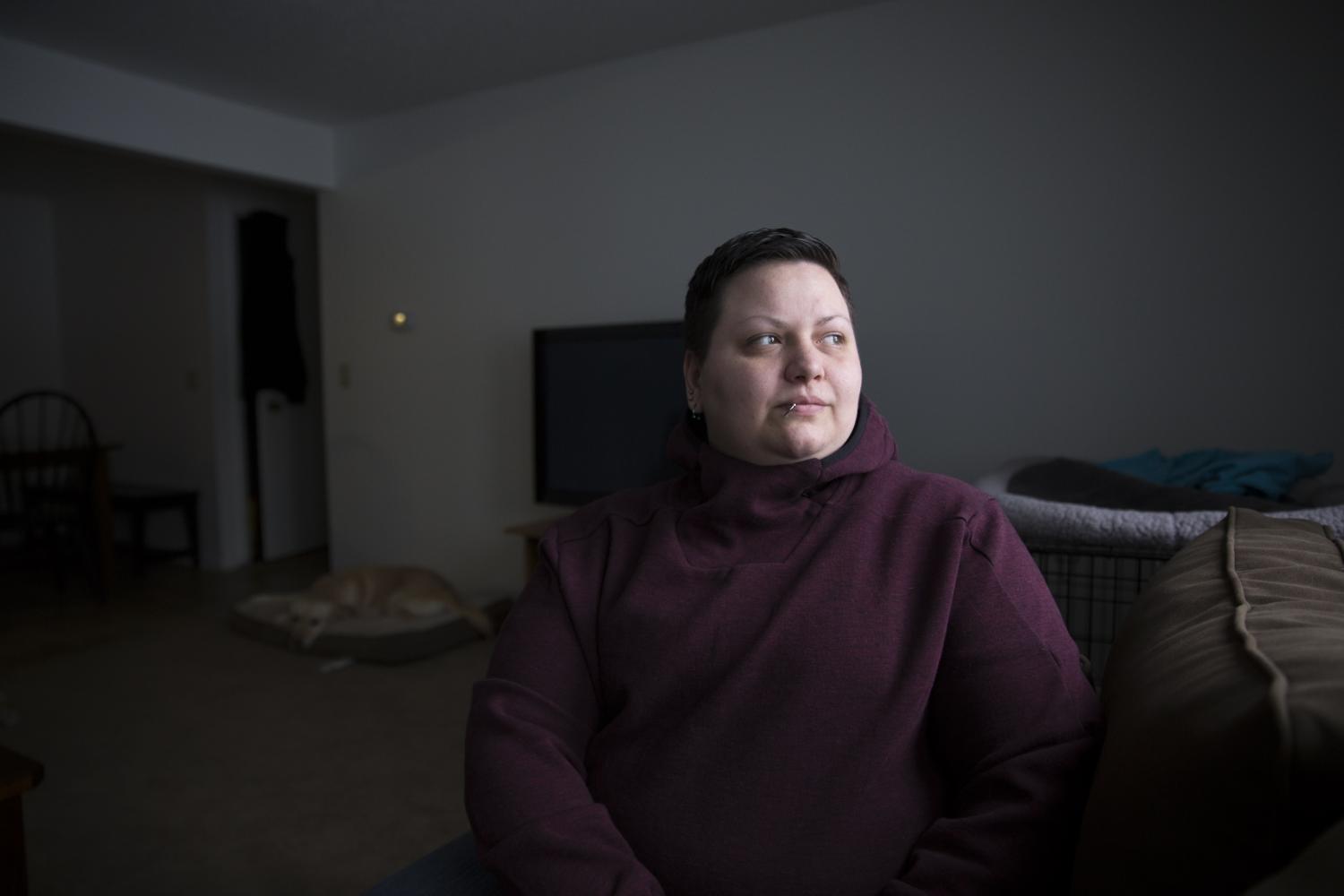From complete darkness to a lack of peripheral vision, from hard-of-hearing to complete loss, blindness and deafness both lie on a spectrum. When a person lies on the end of both spectra, that person can identify as DeafBlind. Sometimes that means limited vision and hearing aids, and sometimes it means a near total lack of hearing and vision. Whatever the loss may be, there are innovative technologies, languages and accommodations to help them navigate the world
Being DeafBlind
"I love touch, I love tactile and I couldn't imagine navigating my life any other way," said Nikk Bouteiller, who graduated in 2017 with a master's degree from RIT. They also received their associate and bachelor's degrees from NTID and RIT, respectively.
Bouteiller uses different modes of communication depending on who they are talking to. If the person is fluent in ASL, Bouteiller either shows them how to sign in a smaller area that they can see or will attempt tactile sign with them. Tactile signing involves the listener placing their hands on the hands of the speaker and feeling the movement. When Bouteiller is communicating with someone not fluent in sign language, they can use their Braille Note Touch to type notes back and forth. That device operates as a normal tablet with a braille display below the touch screen. Bouteiller can access the internet, read and write documents and play games on the app store.
Eric Tong is a fifth year student in the School of Individualized Studies, with an associate degree from NTID in Computer Technology. He also identifies as DeafBlind, and was a student representative on the VSC until he stepped down last semester. He is hard of hearing, with his right ear being completely deaf. With the aid of thick glasses, Tong has enough vision to legally drive, which he does when there is adequate light and good driving conditions.
Tong grew up in an oral environment, and primarily uses voice and sound to communicate. When using technology or handouts, he requires a minimum size 14 font.
While Tong does not need a cane or guide dog to get around, he knows people in the DeafBlind community that do. Guide dogs are an excellent resource and can be trained to help with a variety of tasks. However, a big problem in the service dog industry is dogs getting distracted by people trying to interact or play with the dog.
"Think of a service dog as an extension of the disabled person, and as a piece of medical equipment," Bouteiller said. "Would you go up to someone and ask to pet their oxygen tank? No. Would you make kiss sounds or whistles at someones wheelchair? No. You should do the same for a service dog."
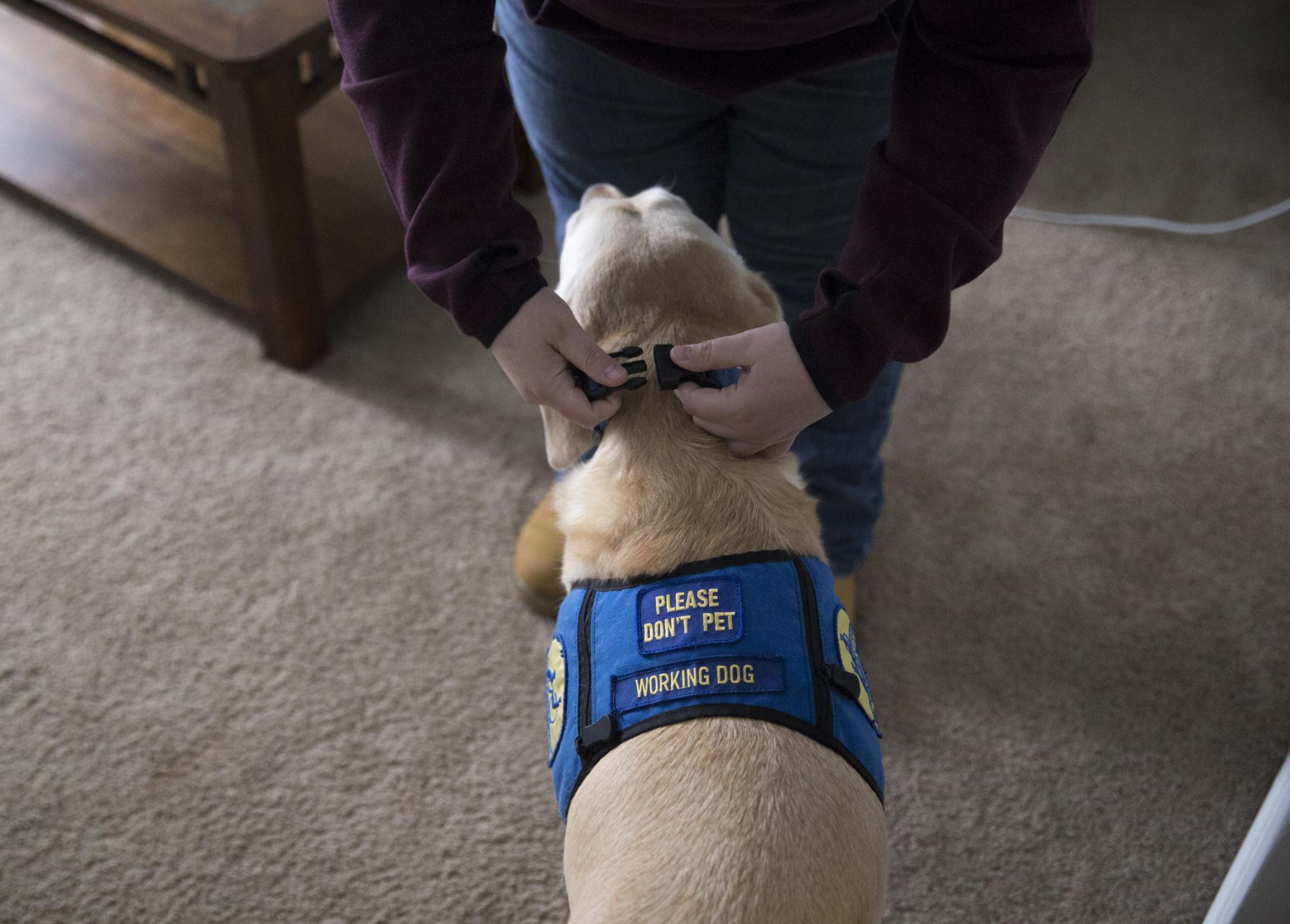
Would you go up to someone and ask to pet their oxygen tank? No ... You should do the same for a service dog.
While it may be hard for many to imagine life with limited or non-existent vision and hearing, it is the reality for many people in the United States. There is no hard data on how many DeafBlind people there are nationally, but Gallaudet University estimates about 45,000 to 50,000 DeafBlind individuals.
Difficulties in an accurate estimate of the DeafBlind population at RIT stems from the fact that an accurate number would require all students to identify themselves with the Disability Services Office (DSO). There are currently 16 DeafBlind students recognized by the DSO, according to DSO Director Sue Ackerman.
The DSO can arrange for accommodations for academics, housing and transportation. In the academic environment, students may need larger fonts, specialized interpreters or high contrast visuals — like dark markers on a whiteboard. Students may need housing in areas with good lighting and rooms on the first floor. There is also an accessible van service DeafBlind students can use if needed.
Harassment and Discrimination
"I ignore the bullies," Tong said.
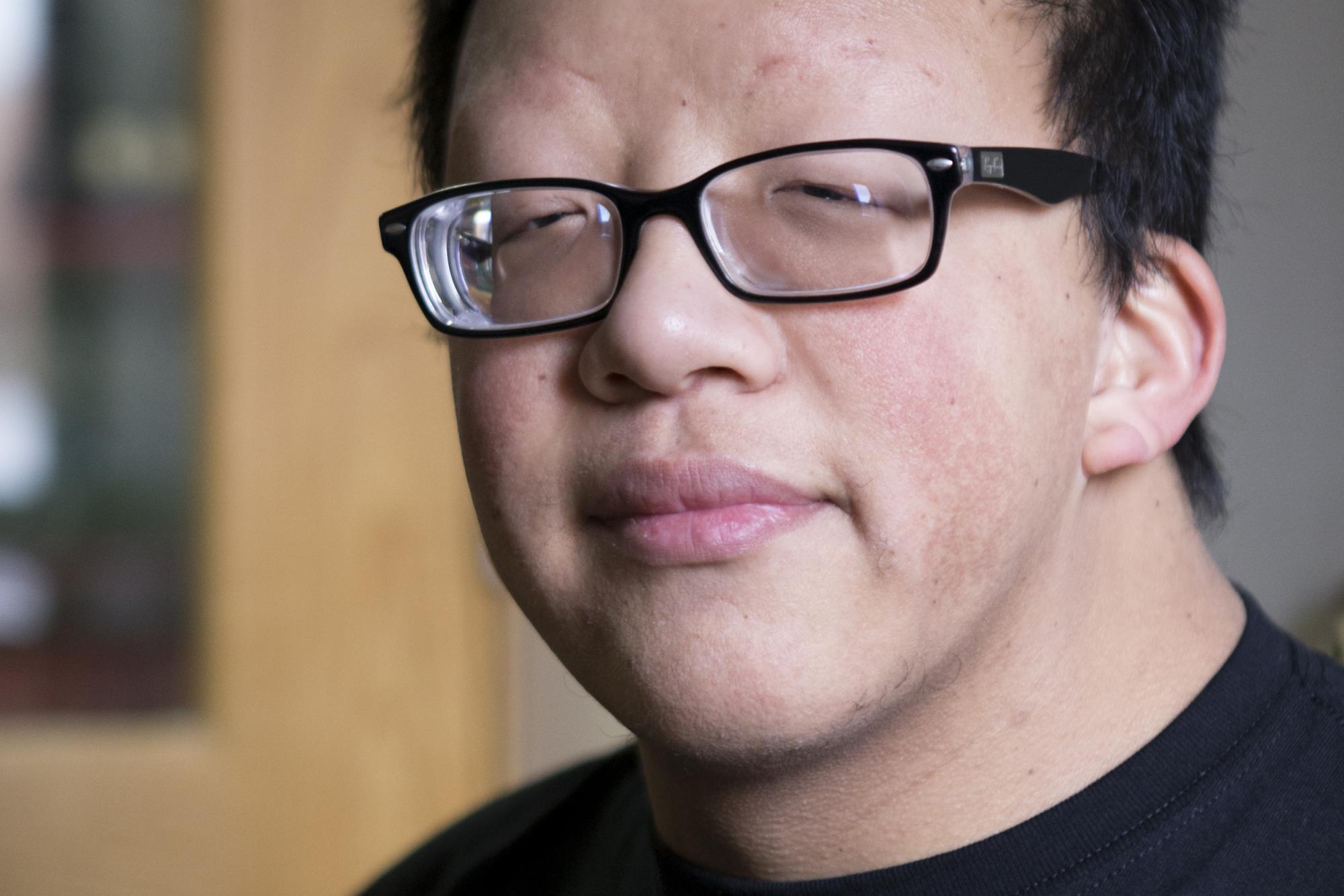
"I ignore the bullies."
Like any minority group, DeafBlind people face difficulties when surrounded by people who do not understand them. Both Tong and Bouteiller stated that they have faced harassment and bullying. Bouteiller was willing to go into more detail.
"I've had people bully me to see if and when I can see them. I've had people touch me to indicate they will try Tactile, only to have them flip me off and walk away," Bouteiller said. "When I am out with my cane, I've had people grab it from me and throw it or I've had people yell at me for bopping their foot with my cane, as if it was my fault for not seeing them and moving out of their way. Some people just stand there and watch me get closer to them with my cane, and then play hopscotch over it and eventually move out of my way."
"I've had people bully me to see if and when I can see them."
The problems don't stop once they enter the classroom though. Tong usually contacts his professors ahead of time to inform them about the accommodations he needs, mostly an enlarged version of any papers being handed out. Bouteiller requires an interpreter trained in low vision or tactile interpreting. However, Bouteiller claimed that the Disability Services Office (DSO) failed to consistently provide them with the appropriate interpreters and accommodations.
Ackerman said that she approves the requests for specialized interpreters, but it is the responsibility of NTID's Department of Access to provide those interpreters. Ackerman said there may be some cases where students request services that RIT isn't required to provide, like mobility training.
"I think that there are some students who don't realize that some of the things they are asking for, RIT doesn't provide and isn't required to," Ackerman said.
While some professors may be open to learning how to help DeafBlind students succeed in their class, Bouteiller has had some issues with professors doubting their abilities. In the past, they had issues with RIT professors requesting that they not take the class because the professor didn't think it would be possible for a DeafBlind person to succeed in that subject. Once, Bouteiller was required to have a meeting with a professor so he could determine whether they were capable of taking the class. Bouteiller was allowed to start the class on a trial basis, but finished the course with an A-, despite feeling constantly belittled.
Professors are encouraged to read the letter of accommodations sent by the DSO and to reach out to the
The VSC usually has student representatives that bring up the issues they are facing. However, the last two representatives left and the VSC is currently looking for DeafBlind students willing to join.
"One of our goals is to keep open communication with the NTID administration about student needs," Mousley said.
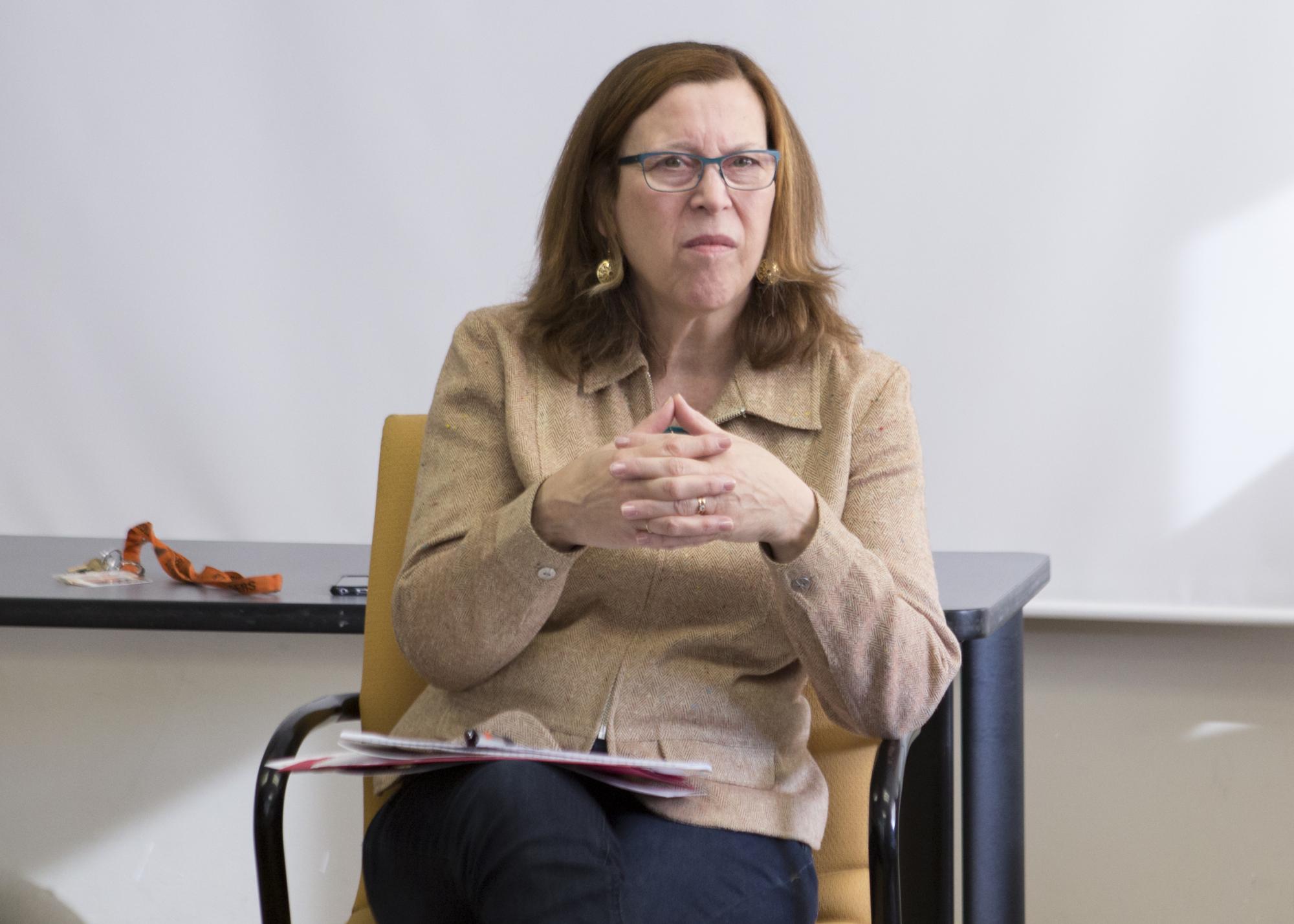
The VSC can provide recommendations for accessibility in different spaces and are currently doing so for the offices of the
NTID's DeafPlus website contains information about resources for NTID students with additional needs, including accommodations for DeafBlind students. Among the resources are information about interpreting services, a monthly eye clinic, transportation around campus and off-campus resources. The VSC also holds socials for DeafBlind students about once every two weeks, according to Mousley. These socials are designed to help DeafBlind students have a sense of community and to support one another.
In addition to the VSC, the Disability Services Office exists to offer support for all RIT students. Accommodations include, but are not limited to, low vision and tactile interpreters, specialized housing and special testing conditions. DeafBlind students submit requests for accommodations and provide proof of their disability. They can then meet with the DSO to discuss what their specific needs are.
"I think it's important that college students advocate for themselves," said Tong.. Ackerman agreed, and urged students who feel like their needs aren't being met to come speak to her.
While the VSC has done a lot to bring awareness of DeafBlind needs to NTID and RIT administration, there have been problems in the past when students felt like their needs weren't being met. In November 2016, a letter was sent by Bouteiller and other members of the DeafBlind community to NTID president Gerry Buckley and past RIT president Bill Destler. This 19 page letter called attention to issues — like accessibility, isolation, bullying, lack of representation, safety concerns, outdated technology and much more — that DeafBlind students were facing that had some withdrawing from RIT. Many of the issues stemmed from an ironic lack of visibility for the VSC.
A vlog detailing the problems students were facing was presented at the NTID convocation. The words of DeafBlind students were signed by an ally.
"Administrations, supposed allies and even the Disability Services Office refuses to be reasonable, accommodate us or strive to understand us, embrace who we are and encourage us to love who we are," the vlog transcript reads. "We isolate, lose our identity, because our home — RIT/ NTID — doesn’t accept who we are as a whole."
Room for Improvement
Since the convocation vlog and letter, the VSC has lost and gained some members. One complaint in the letter was a lack of DeafBlind representation on the VSC. In the past, only the student representatives were DeafBlind, according to the letter. Now, there is one committee member, Voight-Campbell, who uses pro tactile interpreters to communicate with the rest of the committee.
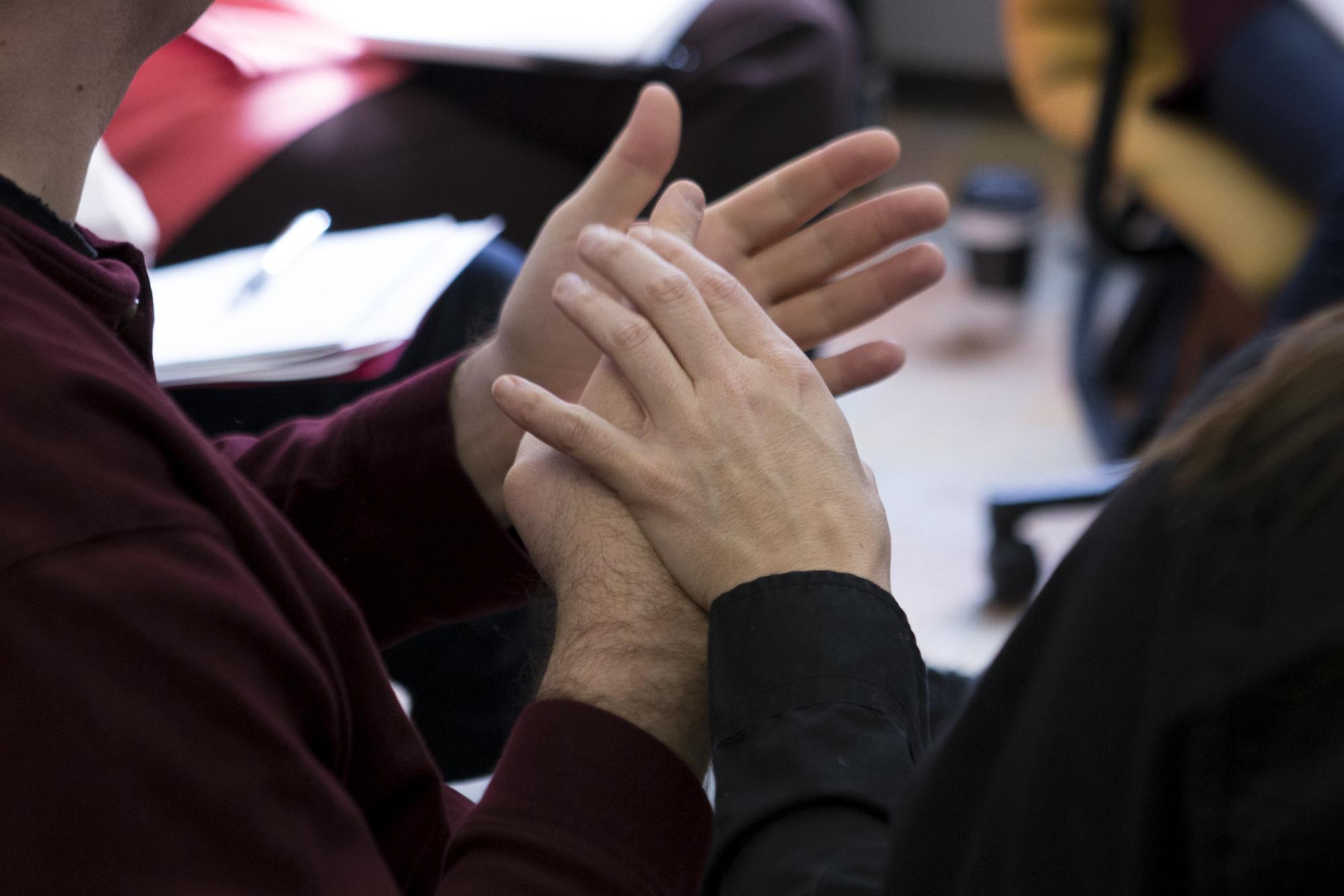
The general sentiment from the letter and Bouteiller was that the VSC meant well, but was underrepresented on campus and did not hold much sway with the administration.
"[I]t is also the hope that by bringing these concerns to your attention that you will be able to meet with us and help establish other solutions and develop a better working relationship with the VSC and DeafBlind students as a whole," the 2016 letter to RIT and NTID administration read.
The VSC has tried to make itself more available to students by table sitting at service fairs and through other outreach programs. They hope to raise awareness of their support and resource network among cross-registered students as well.
There are still problems of accessibility on campus. Tong expressed a need for better lighting on the campus at night. Adequate lighting is necessary for people with low vision to navigate spaces safely. When Tong cannot avoid walking the Quarter Mile at night, he tries to walk with friends for his safety.
At least two students have decided to leave RIT in the last academic year because of the problems they faced on campus related to their hearing and vision loss. One felt socially isolated from their peers and wished that RIT and NTID were more inclusive of students with disabilities. Another student withdrew after struggling to have their needs met in academic settings.
"We [DeafBlind students] are the experts so please come to us, talk to us."





